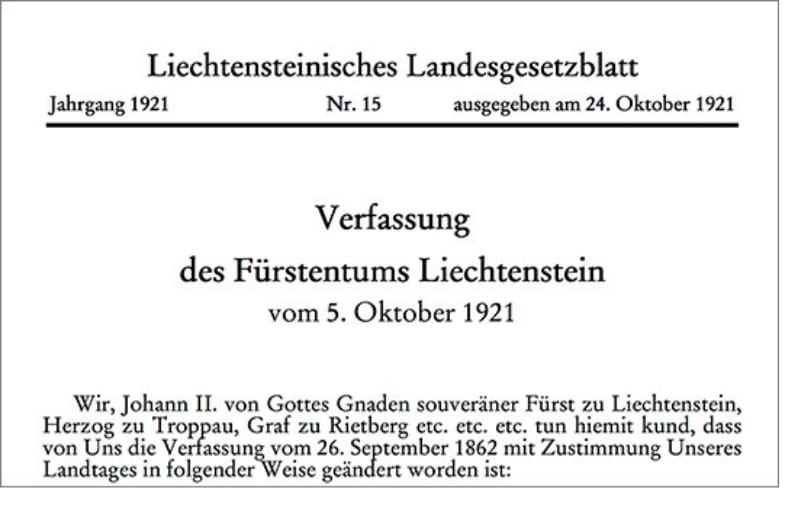
The Liechtenstein Constitution dates from 1921 and uniquely combines a parliamentary democracy with a politically active monarch and pronounced direct democratic rights of the people.
Liechtenstein's constitution of 1921 remained largely unchanged despite the political turbulence and upheavals in 20th century Europe. Only in 2003, after a comprehensive debate on the role of the monarchy in Liechtenstein, a major constitutional reform took place. In a referendum, 64.3 percent of the people voted in favour of the reform proposed by the Princely House. The counter-proposal received only 16.6 percent of the votes. The turnout was 87.7 percent
Staatstragende Monarchie auf demokratischer Basis
Die Verfassungsreform von 2003 folgt der Vision des Fürstlichen Hauses einer staatstragenden Monarchie auf demokratischer Grundlage. Diese repräsentiert die Synthese von Monarchie mit demokratischer Legitimität, beides eingebettet in der sozialen und politischen Struktur des Landes. Fürst Hans Adam II. hat in seinem Buch „Der Staat im dritten Jahrtausend“, 2009 veröffentlicht und seither in viele Sprachen übersetzt, seine persönliche politische Überzeugung und Philosophie klar dargelegt. Seine Vision, die Kräfte der Demokratie wie der Monarchie auf harmonischem Wege zu stärken, fand ihren nachhaltigen Ausdruck bereits in der Verfassungsreform von 2003, die auch das Prinzip der Selbstbestimmung der Gemeinden festschreibt. So haben die Gemeinden die Möglichkeit aus dem Fürstentum auszutreten, sofern dies eine stimmberechtigte Mehrheit einer Gemeinde nach Art. 4 der Verfassung beschliesst.
Das Recht zur Volksabstimmung über die Abschaffung der Monarchie
Die Verfassungsreform bringt weitere Änderungen. So wird das Notverordnungsrecht des Fürsten zeitlichen und inhaltlichen eingeschränkt (Art. 10 der Verfassung). Ernennungsverfahren für Beamte und Richter sind nun ausgewogener gestaltet (Art. 11 und Art. 96 der Verfassung), das Verfahren nach dem Fürst oder Landtag der Regierung das Vertrauen entziehen kann, ist präziser gefasst (Art. 80 der Verfassung). Neu aufgenommenen in das zentrale Rechtsdokument des Staates ist die Möglichkeit eines Misstrauensantrags gegen den Fürsten über eine Volksabstimmung (Art. 13ter der Verfassung). Nach Art. 113 der Verfassung haben die Landesbürger auch das Recht über den Weg der Volksabstimmung für die Abschaffung der Monarchie zu stimmen. Gleichzeitig zeigt dieser Paragraf stärker als alle anderen, wie sehr das Fürstenhaus für eine demokratische Legitimation der Monarchie eintritt.
Die detailliertere Übersicht über die wichtigsten Änderungen der Verfassungsreform: